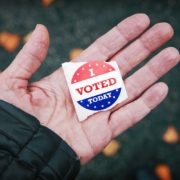 By Rose Oswald Poels
By Rose Oswald Poels
At the heart of the Wisconsin Bankers Association’s (WBA) mission is advocating on behalf of the Wisconsin’s banking industry. In the last year alone, WBA has taken action in combating credit card fees, increasing instances of elder fraud in our communities, legislation that would expand credit union powers, a looming recession, and so much more.
It’s no secret that WBA-member banks play a significant role in the support of our Association. Between political contributions that help further engage our legislators or by participating in Capitol Day, organizing a “Take Your Legislator to Work Day”, or testifying on a bill — the engagement shown by our membership has been paramount in advancing WBA’s efforts over the last 130 years.
I am also lucky to say that, in addition to the thousands of bankers throughout the state who engage with WBA, our Association is also made up of nearly 50 individuals who, like you, are sincerely dedicated to our state’s banking industry.
Earlier this month, WBA hosted its annual staff fundraiser in support of Wisbankpac and Alliance of Bankers for Wisconsin (ABW) — two critical methods of promoting advocacy for the Wisconsin banking industry. This timely event, in which the funds raised are used to help support pro-banking political candidates, welcomed staff donations (though participation was not required) by way of a specified contribution from payroll, a check made out to one of the funds, or the purchase of one or more Jeans Day stickers for a casual dress day at the office. All money raised directly aids in WBA’s advocacy efforts.
For their generosity, and to celebrate Wisconsin’s beloved county fair season, WBA hosted a fair-themed week of events. Ranging from a blue ribbon bake off to games and a cornhole competition, every staff person was able to participate in activities and win prizes.
I am proud to announce that our small but mighty staff was collectively able to crush our goal of $7,000 and raise over $12,350 this year. This amazing feat by our team highlights the commitment each WBA staff member has to the industry and our membership.
As we look ahead to the remainder of this calendar year, it is critical that all WBA-member banks continue to engage with our Government Relations team and take part in supporting our industry. In addition to making political contributions, banks should take a moment to ensure they remain on track to receive WBA’s Gold Triangle or Bankers Involved in Grassroots and Government (BIGG) Award.
The Gold Triangle Club, the highest level of fundraising recognition for banks, is awarded annually through contributions to ABW political conduit, Wisbankpac, or WBA’s issue advocacy fund. Corporate contributions as well as contributions from bank employees and directors count toward Gold Triangle status, and the amount to qualify ranges from $500 to $4,500 based on the size of the bank.
WBA’s BIGG Award expands beyond Gold Triangle fundraising to encompass grassroots advocacy engagement and serves as the Association’s highest level of recognition for overall advocacy. To learn more about how your bank can earn these prestigious awards, please contact Lorenzo Cruz, vice president – government relations, or me.
As I’ve stated in previous publications, the support and involvement of every member bank is critical to the continued success of our advocacy efforts. With the goal of raising $300,000 by the end of this year, it truly requires a team effort to keep our Association on target to continue surpassing our goals for the industry!



